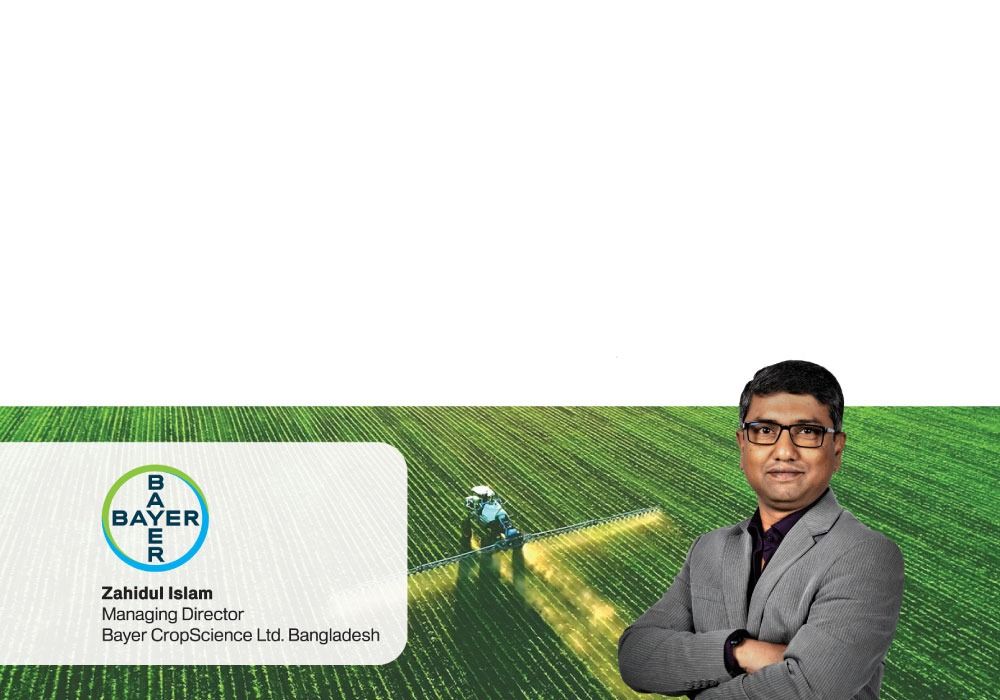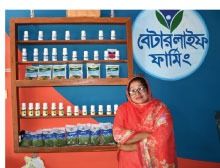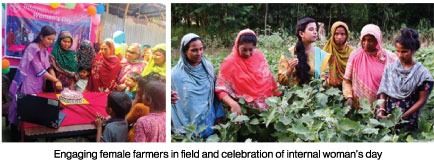- info@ficci.org.bd
- |
- +880248814801, +880248814802
- Contact Us
- |
- Become a Member
- |
- |
- |
- |
- |

Agriculture in Bangladesh: A Pillar of the Economy
Agriculture is a cornerstone of Bangladesh's economy, employing approximately 40% of the workforce and contributing around 14% to the nation's GDP. Among these workers, smallholder farmers who comprise about 80% of the agricultural population play a crucial role in food production and rural development. These farmers typically cultivate less than two hectares of land, yet they are responsible for producing a significant portion of the country's staple crops, including rice and vegetables.
Key Components of Bangladesh's Agriculture
1. Irrigation: Approximately 60% of farmland is irrigated, utilizing both traditional methods and modern techniques to enhance productivity.
2. Livestock: Cattle, goats, and poultry are commonly raised, significantly contributing to rural livelihoods.
3. Aquaculture: The country is renowned for its fish farming, ranking among the top producers of freshwater fish.

Ancient and Medieval Periods
Initially, agriculture in Bangladesh was largely subsistence-based, with farmers cultivating rice, pulses, and vegetables primarily for their consumption. Traditional irrigation methods, leveraging the country's extensive river systems, were developed to support these practices.
Colonial Era (18th-20th Century)
The British colonial rule marked a shift towards commercialization, focusing on cash crops like jute, tea, and indigo. This era also saw changes in land tenure systems, significantly impacting farmers' rights and productivity.
Post-Independence (1971 Onwards)
The Green Revolution in the 1970s introduced high-yielding varieties (HYVs) of rice and wheat, significantly boosting agricultural production. The government implemented various policies to support farmers, including subsidies for fertilizers and improved irrigation facilities.
Modern Era (2000s - Present)
Today, farmers are diversifying their crops, incorporating fruits, vegetables, and fish farming to enhance food security and income. There is a growing emphasis on sustainable practices to address environmental challenges and ensure long-term productivity. Technological advancements, such as mobile applications for market information and weather forecasts, have further improved farmers' decision-making.
Celebrating Success in Agriculture
The success of agriculture in Bangladesh is evident in various key areas:
1. Increased Production: Bangladesh produces over 35 million tons of rice annually, thanks to the introduction of high-yielding varieties during the Green Revolution. Crop diversity, including jute, potatoes, and vegetables, has also increased.
2. Technological Advancements: Improved irrigation methods and fertilizer use have enhanced yields, with around 60% of farmland now irrigated. Investments in agricultural research have led to resilient crop varieties and better farming practices.
3. Economic Impact: Agriculture plays a crucial role in employment, accounting for about 40% of the workforce, and significantly contributes to rural livelihoods and poverty reduction. The sector represents approximately 14% of the national GDP.
4. Food Security: Bangladesh has made significant strides toward food self-sufficiency, particularly in rice, reducing reliance on imports.
The Role of Agri-Input Suppliers
Agri-input-supplying firms are instrumental in the success of agriculture in Bangladesh. Their contributions can be highlighted in several areas:
1. Enhanced Productivity: These companies provide high-quality seeds, fertilizers, pesticides, and herbicides that enhance crop yields. The introduction of high-yielding and disease-resistant seed varieties has significantly boosted production across various crops.
2. Access to Technology: Agri-input suppliers introduce modern agricultural technologies and practices, aiding farmers in adopting efficient cultivation methods. Many companies also offer training programs and technical support to ensure effective use of their products.
3. Economic Growth: The sector is enabling job creation not only within the input companies but also areas of distribution and retail, contributing to the rural economy and market development.
4. Sustainability Initiatives: Many input suppliers focus on sustainable and eco-friendly products, such as organic fertilizers and biopesticides, promoting environmentally responsible farming practices. They also advocate integrated pest management to minimize chemical use while effectively managing pests.
5. Research and Development: Investment in R&D by such companies have led to the introduction of innova- tive products tailored to local conditions. Collaborations with agricultural research institutions help develop effective solutions for crop production and pest management.
6. Improved Food Security: By supplying inputs that enhance crop resilience, these companies contribute to better food security and nutritional outcomes across the country.
Bayer CropScience Bangladesh: A Leader in Agricultural Innovation
Bayer CropScience in Bangladesh plays a pivotal role in supporting the agricultural sector through its innovative initiatives aimed at empowering smallholder farmers.
 1. Better Life Farming Initiative: Bayer's comprehensive program serves as a one-stop solution for farmers, providing essential resources and knowledge to enhance productivity and livelihoods. Through training, quality inputs, and market access, the initiative empowers women farmers, women agri-consultants, and women entrepreneurs in a three-tier ecosystem that promotes diversity, equity, and inclusion. The Better Life Farming initiative further creates employment opportunities, allowing rural residents to become entrepreneurs. With over 740 centers nationwide, women entrepreneurs are connecting farmers through digital tools and have successfully onboarded more than 4,000 women farmers, driving sustainable growth in the agricultural sector.
1. Better Life Farming Initiative: Bayer's comprehensive program serves as a one-stop solution for farmers, providing essential resources and knowledge to enhance productivity and livelihoods. Through training, quality inputs, and market access, the initiative empowers women farmers, women agri-consultants, and women entrepreneurs in a three-tier ecosystem that promotes diversity, equity, and inclusion. The Better Life Farming initiative further creates employment opportunities, allowing rural residents to become entrepreneurs. With over 740 centers nationwide, women entrepreneurs are connecting farmers through digital tools and have successfully onboarded more than 4,000 women farmers, driving sustainable growth in the agricultural sector.

2. GeoPotato Initiative: The GeoPotato program in Bangladesh, implemented by Bayer in partnership with Wageningen Plant Research, Terrasphere, mPower, and governmental institutions, enhances potato cultivation by providing smallholder farmers with a precise decision support service that offers preventive spray advice against late blight, a significant fungal disease. Utilizing geodata for an early warning system, the program alerts farmers to potential infection periods. Since its launch, GeoPotato has onboarded 50,000 farmers and aims to reach 1 million by 2030, helping to reduce crop losses and improve profitability for thousands of farmers in the region. This initiative empowers farmers to make informed crop protection decisions, ultimately enhancing their income and resilience against climate shocks.
3. Climate-Smart Varieties: In addition to GeoPotato, Bayer is dedicated to developing climate-smart seed varieties that are resilient to environmental stresses. These varieties help farmers maintain yields despite challenging conditions, contributing to food security and sustainability.
4. Direct Seeded Rice: Bayer's Scale Direct initiative promotes Direct Seeded Rice (DSR) as a sustainable alternative to traditional transplanting, focusing on farmer education, innovative technologies, and collaboration with research institutions and NGOs to enhance productivity and address challenges like water scarcity and labor shortages. The DSR program significantly reduces labor and water usage by up to 50%, allowing farmers to save costs and increase productivity while enabling higher cropping intensity and reducing greenhouse gas emissions. In regions like Nilphamari, Bangladesh, 45 farmers have cultivated 16 hectares using high-yielding varieties supported by the International Rice Research Institute (IRRI).
5. Innovations in Crop Protection Solutions: Bayer is at the forefront of developing advanced crop protection solutions that are both effective and environmentally responsible. Their new formulations focus on integrated pest management, reducing the need for chemical applications while effectively controlling pests. This approach minimizes the ecological footprint and promotes sustainable farming practices.
6. Seed Innovations: Bayer is continually investing in R&D to develop high-quality seeds that are resistant to diseases and pests. These innovative seed varieties not only increase crop yields but also enhance resilience to climate change, ensuring that farmers can adapt to changing environmental conditions.
7. New Technologies: Bayer is leveraging cutting-edge technologies such as digital farming tools and precision agriculture. These technologies help farmers make informed decisions based on real-time data regarding weather patterns, soil health, and crop performance. By integrating technology into farming practices, Bayer empowers farmers to optimize their resources and maximize productivity.
8. Sustainability Focus: Bayer's commitment to sustainable agriculture is evident in its promotion of eco-friendly practices and products. By advocating for integrated pest management and providing access to organic fertilizers, Bayer helps farmers adopt practices that protect the environment while improving their yields.
Through these initiatives, Bayer CropScience Bangladesh is not only enhancing agricultural productivity but also fostering a more resilient and sustainable farming community, bridging the gap between traditional practices and modern technology.
Future Directions and Recommendations
As Bangladesh's agricultural sector faces challenges such as climate change, urbanization, and the loss of arable land, innovative farming solutions are essential. Future directions should include:
1. Mechanization: Increasing the adoption of mechanization in farming practices can enhance efficiency, reduce labor costs, and improve productivity. Mechanized tools and equipment can help farmers manage their fields more effectively.
2. Regenerative Agriculture: Emphasizing regenerative agricultural practices can improve soil health, enhance biodiversity, and increase resilience against climate impacts. This approach focuses on restoring ecosystems while maintaining productivity.
3. Digital Technology: Leveraging digital technologies, such as mobile applications and data analytics, can provide farmers with critical information on weather, market prices, and best practices. This information empowers farmers to make informed decisions that enhance productivity and sustainability.
4. Continued Support for Agri-Input Suppliers: Supporting agri-input suppliers, will further enhance productivity and sustainability, ensuring a robust agricultural future for Bangladesh.
By integrating these strategies, the agricultural sector in Bangladesh can navigate future challenges, improve resilience, and contribute to food security and economic growth.





